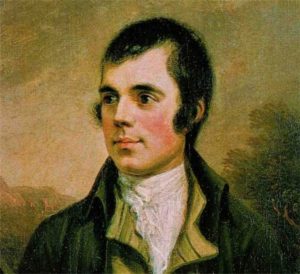We begin the week with a look at two articles about Robert Burns as the world gets ready to celebrate a virtual Burns Night.
New Book on Scotland’s Bard Released

Today marks Burns Night, the annual event where people come together to celebrate Robert Burns, his life and his poetry. Of course, this year events will look a little different due to the lockdown that is in place, with many celebrations instead taking place online.
Pauline Mackay, who is a leading authority on the poet says that we shouldn’t just save his work for this one occasion in the year but should be enjoying it all year round. “Burns for Every Day of the Year” is her new book that offers readers a look at the work and life of Burns through his songs, prose and poems. The book includes all of the classics that people associate with Burns as well as taking a look at some of his lesser-known works and also some of his private letters. They offer a fantastic insight into his views on society, religion, politics and love.
Mackay is a lecturer at the University of Glasgow where she specialises in Robert Burns Studies. She has enjoyed the bard’s poetry from a young age, she loves the way in which he used language in his writing. She studied Scottish Literature at University before deciding that she wanted to carry the study on further and look in-depth at Burn’s work.
Her work looked at those writing’s that were penned by Burns and then censored or suppressed during the 18th, 19th and even 20th century. Her PhD was on the sexually explicit, bawdy writings of the poet that were predominately printed in 1799 in “The Merry Muses of Caledonia”.
In writing her new book, she has tried to map out key events in the poet’s life and match them to some of his most famous pieces, once she had these complete, she filled in some of the gaps. She has also written in some key thematic “pockets” which she hopes will help readers to understand the world at the time particular pieces were written and why Burns might have been preoccupied with topics.
Whilst people cannot congregate this year for live events for the Scottish bard, she hopes that there will still be plenty of virtual get together with the traditional poetry and that perhaps this year people will continue to look at the works of Burns for the rest of the year as well.
Robert Burns Never Heard the Auld Lang Syne We Know
The Scottish Bard would never have heard the Auld Lang Syne version that is so commonly known today. Whilst Burns penned the lyrics they were not combined with the tune that we know today until three years after his death. The combination was created by George Thomson who was the song editor for the poet.
This topic is just one of several that is looked at in “The Oxford Edition of the Works of Robert Burns” which is due to be published on 18th February. The relationship that Burns had with his editor was a stormy one, and he was accused of making numerous changes to the poet’s songs following his death and making considerable sums of money in the process. Much of this was work for which he had failed to pay Burns.
Following the poet’s death, Thomson matched many of his lyrics to more contemporary music including some pieces written by Beethoven and Haydn.


You must register to comment. Log in or Register.